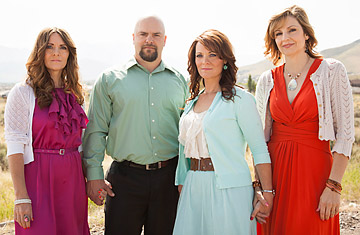
Joe Darger with his three wives, from left, Vicki, Val and Alina. Vicki and Val are identical twins.
(4 of 6)
The trio, who got together at a science-fiction convention (polyamorists are often fans of the works of Robert Heinlein), have tried to mimic marriage as much as they can. They've bought a house together. They are one another's health care proxies. Matt and Katherine are trying to have a baby, and Amoroso is looking forward to co-parenting. "If we lived in a society that permitted plural marriage, it's something I'd think about," says Matt. "But we live together, we support each other, we spend time together, so I've got the stuff I want."
Amoroso and Darger don't know each other, and there's not much else they'd agree on, but they're brothers in arms in the fight against what they see as a monogamy monopoly. Amoroso served on the board of the Alternatives to Marriage Project, and he speaks at conventions about his living arrangement. "Our lives are much the same as other people's," he says. "It's important to me that there's understanding and acceptance." The reaction he gets from most people, including his family and employers, is raised-eyebrow acceptance: "It wouldn't work for me, but if it makes you happy ..."
Why do some people want multiple life partners when most of us can barely deal with one? Both fundamentalist Mormons and polyamorists argue that having several partners requires people to be more loving and generous and to learn to overcome jealousy. There's a term polyamorists use for enjoying their lover's happiness with another: compersion. (The word is thought by some to have originated in the '80s at a San Francisco commune by people using a Ouija board.) Fundamentalist Mormons believe the practice mirrors the selfless interconnectedness that will exist in heaven. They call it "living the principle."
Compersion and living the principle sound noble. The results often aren't. "When plural marriage works, it can be much more rewarding," says Darger. "But I think getting it there is not three times as hard. It's to the third power as hard." Many books have been written by ex-polygamist wives and children that detail neglect, infighting and even sexual abuse. "My wedding day was, bar none, the saddest day of my life," says Mary Mackert, who comes from a long line of fundamentalist Mormons and at 17 became the sixth wife of a 50-year-old man. She has an explanation for the Darger wives' apparent contentment. "Denial was my drug of choice too," she says. "I just quit feeling anything. I put on a beautiful smile." Her family, she says, was blindsided when she walked out after 16 years.
